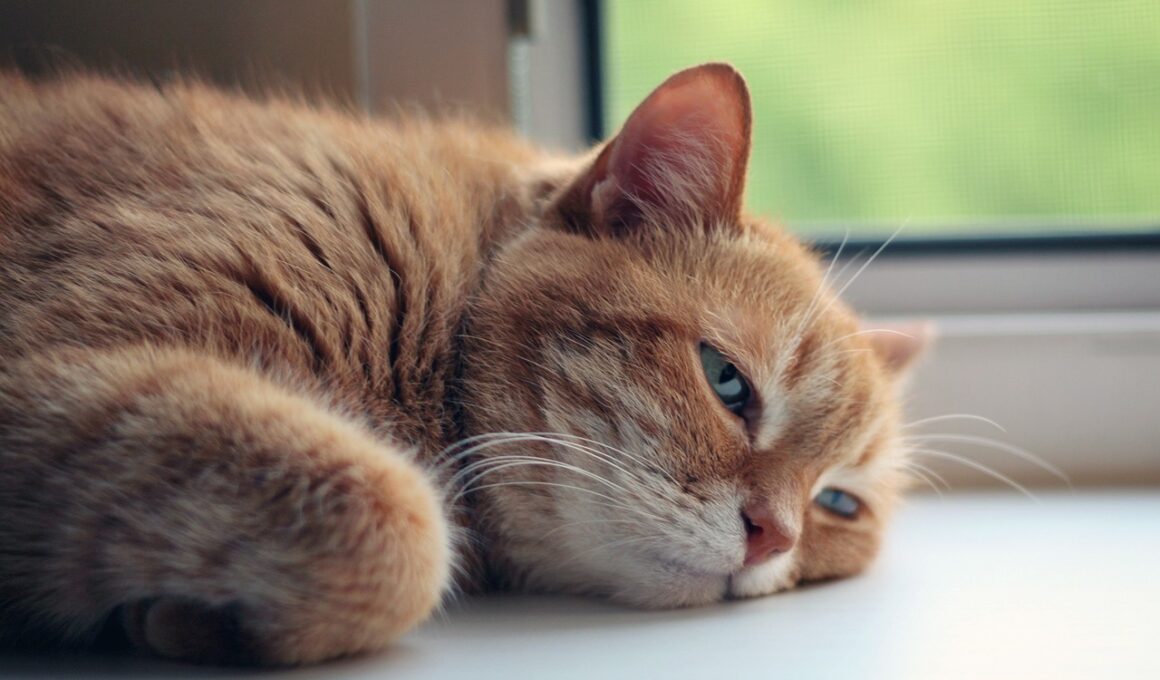How Heat Affects Your Cat’s Appetite and Energy Levels
Understanding a cat’s behavior during heat is crucial for cat parents. When female cats, also known as queens, enter heat, their bodies undergo significant hormonal changes. These changes can cause alterations in their appetite and energy levels. During heat, some cats may experience an increase in sexual urges, which can affect their daily routines. As a result, they may exhibit different feeding habits. While some queens may show a decreased interest in food, others may exhibit more erratic appetites. This inconsistency can be attributed to the hormonal fluctuations taking place. Additionally, it’s not uncommon for cats in heat to become more vocal and affectionate, seeking attention more than usual. This behavioral change can also drain their energy levels more rapidly than during other times. To help manage these changes, ensuring your cat has access to plenty of fresh water and maintaining a consistent feeding schedule is crucial. Keeping a watchful eye on your cat’s eating and drinking habits during heat is vital as it ensures their overall well-being and health. Be prepared for these changes, and consult your vet if you notice unusual shifts in behavior!
Changes in Appetite During Heat
During the heat cycle, a female cat’s appetite can fluctuate significantly. Many cat parents notice their pets nibble less frequently or skip meals altogether. This temporary decrease in appetite can be attributed to the heightened sensitivity and distraction caused by the mating instinct. Cats might become preoccupied with finding a mate instead of focusing on eating. Conversely, some cats may respond by overeating when they feel emotionally stressed or anxious. This odd variation makes feeding habits highly individual and can differ greatly between cats. If your cat is showing signs of diminished appetite, try offering a variety of enticing foods to encourage their consumption. Wet food often proves to be more appealing due to its strong aroma, which may stimulate their interest in eating. Monitoring the quantity of food consumed is essential during this time. Signs of significant weight loss or prolonged fasting should be addressed promptly, as they can lead to serious health concerns. Offering food in small, frequent meals can also lessen their stress levels during this phase. Understanding these fluctuations in appetite plays a crucial role in caring for your beloved feline companion.
Acat’s energy levels can also see remarkable changes during heat. Often, queens may become hyperactive and playful, exhibiting bursts of energy as they search for companions. This energetic shift is likely due to hormonal surges which boost their desire to engage. Even though cats present as more active during this phase, their behavior may lead to increased stress and anxiety. Pet parents may find their cats engaging in restless behavior, such as excessive pacing or meowing loudly. These behaviors often stem from their need to attract potential mates, so it’s important to provide a suitable outlet for their energy. Interactive playtime can help redirect their restless energy into something more productive and enjoyable. Engaging in various activities like chasing feather toys or engaging with puzzle feeders can provide ample stimulation. This approach not only satisfies their playful instincts but also helps build a bond between the cat and the owner. Providing outlets for energy can prevent unwanted behavior, ensuring a happier experience for both the cat and its owner during this challenging time. Consider their mental and physical needs as vital parts of their overall health.
Managing Your Cat’s Changes
Being proactive in managing your cat’s appetite and energy levels during heat can be beneficial in ensuring their comfort. First, create a calm environment, as stress can exacerbate their anxiety and affect eating habits. A quiet and familiar space helps them feel secure. Regularly scheduled feeding times can also offer a structure that comforts them. Consider feeding high-quality food that provides the necessary nutrients your cat needs, offering both dry and wet options to entice your cat during this period. Since cats may become less interested in food altogether, if they demonstrate prolonged refusal to eat, it’s essential to consult your veterinarian for advice. They can recommend either alternative food types or suggest other solutions tailored to your particular cat. Ensure your cat has access to fresh water at all times, reducing the risk of dehydration, which can be an issue during more demanding behavioral phases. Maintain a routine that normalizes feeding throughout their heat cycle. It’s important that you closely monitor their overall demeanor and energy levels. This vigilance can prevent various health issues and ensure that your cat remains healthy and thriving while experiencing these typical changes.
Socialization during your cat’s heat cycle becomes essential, as their increased affection-seeking behavior can change how you interact. While looking for companionship, they might become clingy or even demanding of attention. This desire for social contact could lead to some cats becoming more vocal, wanting to be involved in every part of your day. It is vital to be patient and understanding during this period. Engaging in gentle playtime and providing affectionate attention can help keep them calm and fulfilled. However, be careful that these behaviors do not lead them to become overly dependent or jealous of other pets. Scheduled play sessions can help manage their energy while keeping interactions positive. Enjoying quality time together during this unique phase creates stronger bonds and reduces stress. Provide them with safe spaces where they can retreat whenever they need the confidence boost. If you have other cats or pets, monitor interactions to ensure a peaceful dynamic, reducing competition and stress. By maintaining awareness of their social needs, you can help your cat feel more at ease within the home environment, providing the support they need.
Recognizing Behavioral Red Flags
Monitoring your cat for behavioral changes during heat can be crucial for identifying any red flags indicating distress or health issues. If you notice your cat becoming excessively aggressive, anxious, or withdrawn, it could signal an underlying problem. Signs of severe stress can include hiding more than usual, significant vocalization, or even changes in litter box habits. An abrupt change in toilet behavior can sometimes indicate problems that may need veterinary attention. Be attentive to any significant weight loss or prolonged refusal to eat, as these can indicate health problems in addition to behavioral changes. If any of these behaviors persist, it’s essential to schedule a visit with your veterinarian to rule out underlying medical conditions. Your cat’s mental and physical health must remain interconnected during this period. Early identification of these issues can considerably prevent them from escalating into more serious matters. By being proactive and observant, you can better support your feline friend through these challenging times. Offering them the care and attention they deserve will lead to a happier, healthier cat.
As your cat navigates their heat cycle, maintaining their overall well-being is paramount. Understanding the nuances of feline behavior during this time enhances your ability to provide appropriate care. Monitor feeding and hydration habits diligently. Implement strategies that promote healthy eating, balanced hydration, and productive outlet for energy. Engaging in playful activities not only prevents destructive behaviors but also nurtures the bond between you and your pet. Providing a stress-free environment is also crucial for your cat’s overall mental state. Ensure that they have their own space to retreat when feeling overwhelmed, creating a safe haven in your home. Regular check-ins with your feline companion can give insights into what they need, allowing you to be attentive to their experiences. This awareness helps to improve their mood and minimizes distress. Celebrate small wins throughout this period, as adapting to their changing needs is also an achievement. By staying attuned to their desires and associating love and care with their current situation, you can foster positive experiences during their heat cycle. Embrace this unique phase of their life, and cherish the insights it brings into understanding their behavior.


